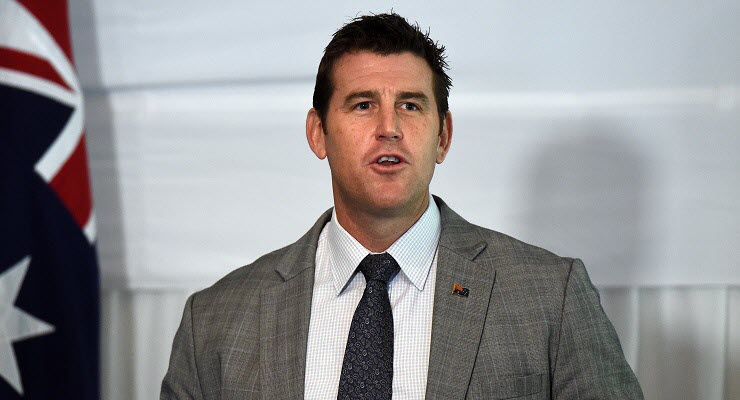
A lot is at stake for highly decorated former soldier Ben Roberts-Smith, who was allegedly involved in seven unlawful killings during his time serving in the Special Air Service Regiment (SAS) in Afghanistan.
Millions of dollars in debt, Roberts-Smith is at the centre of an Australian Federal Police (AFP) investigation into the death of Ali Jan, an Afghani villager. He’s also fighting a costly defamation suit against the Nine papers, refusing to back down as evidence against him mounts.
Where’s the case up to?
Last Wednesday, the Federal Court ruled that preliminary findings made by a war crimes inquiry into Roberts-Smith’s conduct in Afghanistan be redacted and released to lawyers on both sides of the defamation case.
The Inspector-General of the Australian Defence Force (IGADF) documents consist of hundreds of pages, including a “potentially affected person” (PAP) notice issued to Roberts-Smith. PAP notices are issued to people who are the subject of an adverse finding or recommendation.
The inquiry report is likely to be handed over on Thursday. While it won’t include any names, it will detail incidents and statements.
The defamation trial is scheduled for June next year and is expected to run for between six and eight weeks, though it may go longer.
Roberts-Smith is also alleged to have punched his ex-mistress in the face and allegedly coached her to lie about their relationship, bringing his credibility into question.
A costly venture
The defamation proceedings are being funded by Seven chairman Kerry Stokes, who appointed Roberts-Smith as general manager of Seven’s Brisbane and Queensland divisions in 2016. Seven West’s media coverage of Roberts-Smith has been glowing.
The Australian Financial Review reports Stokes has loaned Roberts-Smith $1.9 million so far — roughly the same amount Roberts-Smith’s house is worth. It’s not known whether Roberts-Smith will be asked to pay back the loan if he loses the suit.
Last week at Seven’s annual general meeting (AGM), Stokes stood by Roberts-Smith, calling him a “very valued executive” who had “performed excellently” in his role.
It’s likely the IGADF documents won’t reflect well on the Australian War Memorial, of which Stokes is chairman. Two portraits of Roberts-Smith are featured in the memorial’s collection.
Criminal proceedings possible
The AFP has been investigating Roberts-Smith and Jan’s death since mid-2018. No charges have been laid.
Curtin University national security and strategic studies associate professor Alexey Muraviev told Crikey Roberts-Smith could face jail time.
“Ramifications can range from dishonourable discharge, and could potentially lead to a criminal filing and jail sentence,” he said.
But, he said, when ruling on a sentence a judge would take into account Roberts-Smith’s track record, service to the country and deployment into hot spots.
He said investigators faced a difficult task when dealing with Australia’s most decorated soldier.
“It’s really important to ensure that if a criminal act has been committed those responsible will be dealt with appropriately,” he said.
But, Muraviev added, “it shouldn’t be politicised when investigators feel pressured to deliver outcomes to appease the public and political agenda”.
Effect on the forces
Depending on the outcome of the inquiries, there could be flow-on effects to the SAS, Muraviev said.
“There’s no such thing as a bad solider, you either have ineffective or effective commanders who have trained their units properly,” he said, adding that if the culture and leadership of SAS regiments are found to be tainted, entire units can be dismantled.
Prime Minister Scott Morrison has not ruled out disbanding the SAS.
Importantly, Muraviev said, context needed to come out in the IGADF reports and during any criminal investigations.
“We also have to take into account the specifics, methodology and philosophy of reparations of units like SAS,” he said.
“They’re behind enemy lines, they’re supposed to remain invisible … That may mean no witnesses should be allowed to leave.”
If these sorts of details were left out — either redacted in the IGADF reports or criminal investigations — current soldiers would feel short-changed, he said.
“If some of the specifics are missing in the release of the IGADF report, it would have a seriously detrimental effect on the morale of the serving members,” Muraviev said.
Following his long-running investigation, ADF Inspector-General Paul Brereton is expected to find a small group of special forces troops committed shocking acts.
Roberts-Smith denies all allegations against him. In a statement, he said he supported the appointment of a special investigator to look into the alleged war crimes.
“It is heartening to hear these matters, which have been the subject of rumours for years, will now be examined by a special investigators office with expertise and experience to consider evidence not just rumours and make decisions based on evidence rather than unsubstantiated rumours.’’








Crikey encourages robust conversations on our website. However, we’re a small team, so sometimes we have to reluctantly turn comments off due to legal risk. Thanks for your understanding and in the meantime, have a read of our moderation guidelines.